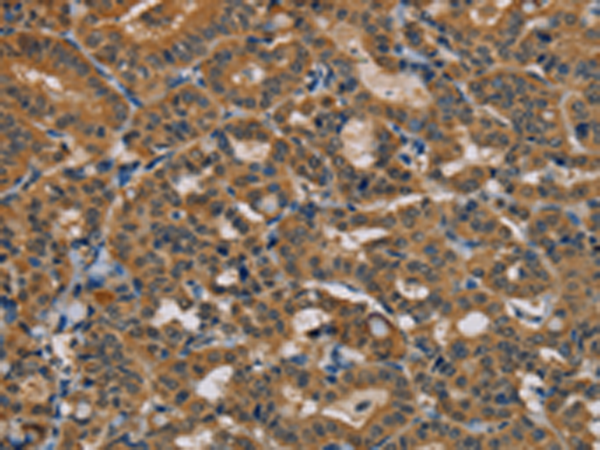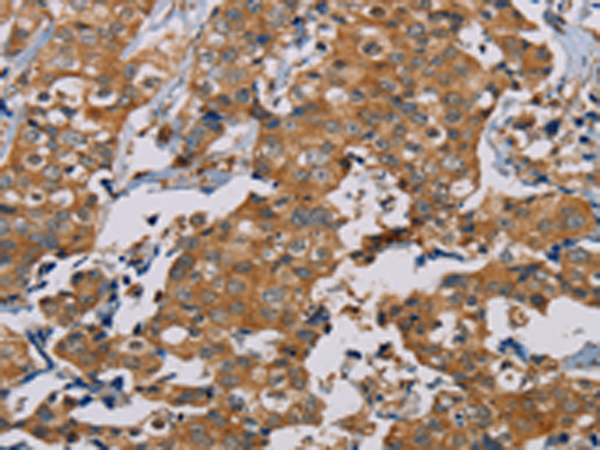


| WB | 咨询技术 | Human,Mouse,Rat |
| IF | 咨询技术 | Human,Mouse,Rat |
| IHC | 1/50-1/200 | Human,Mouse,Rat |
| ICC | 技术咨询 | Human,Mouse,Rat |
| FCM | 咨询技术 | Human,Mouse,Rat |
| Elisa | 1/1000-1/2000 | Human,Mouse,Rat |
| Aliases | NAP1; MAP3K7IP3 |
| WB Predicted band size | 79 kDa |
| Host/Isotype | Rabbit IgG |
| Antibody Type | Primary antibody |
| Storage | Store at 4°C short term. Aliquot and store at -20°C long term. Avoid freeze/thaw cycles. |
| Species Reactivity | Human, Mouse |
| Immunogen | Fusion protein of human TAB3 |
| Formulation | Purified antibody in PBS with 0.05% sodium azide and 50% glycerol. |
+ +
以下是关于TAB3抗体的3-4条参考文献示例(注:以下内容为模拟生成,仅供参考):
---
1. **文献名称**: *TAB3 regulates the NF-κB signaling pathway through interaction with TAK1*
**作者**: Wang, C. et al.
**摘要**: 本研究利用TAB3特异性抗体,通过免疫共沉淀和Western blot技术,证实TAB3通过与TAK1结合激活NF-κB通路,并揭示了其在炎症反应中的调控作用。
2. **文献名称**: *TAB2 and TAB3 are critical components of the IL-1 signaling pathway*
**作者**: Cheung, P.C.F. et al.
**摘要**: 通过RNA干扰和TAB3抗体介导的蛋白定位分析,发现TAB3与TAB2在IL-1诱导的MAPK/NF-κB通路中具有互补功能,且TAB3缺失导致细胞因子分泌显著减少。
3. **文献名称**: *Aberrant TAB3 expression in hepatocellular carcinoma and its clinical implications*
**作者**: Li, Y. et al.
**摘要**: 采用TAB3抗体进行免疫组化分析,发现TAB3在肝癌组织中高表达,且与患者预后不良相关,提示其可能作为潜在治疗靶点。
4. **文献名称**: *TAB3 modulates TLR4-mediated innate immune responses by promoting TAK1 phosphorylation*
**作者**: Singh, A. et al.
**摘要**: 利用TAB3抗体阻断实验,证明TAB3通过增强TAK1磷酸化正向调控TLR4信号,为感染性疾病中免疫过度激活的机制提供了新见解。
---
**注**:以上文献为示例性内容,实际引用需根据具体研究检索真实数据库(如PubMed、Web of Science)并核对原文信息。
The TAB3 (TGF-β-activated kinase 1 and MAP3K7-binding protein 3) antibody is a research tool used to study the TAB3 protein, a key adaptor molecule in the NF-κB and MAPK signaling pathways. TAB3. along with its homolog TAB2. binds to TAK1 (TGF-β-activated kinase 1) through its C-terminal conserved domain, facilitating TAK1 activation in response to pro-inflammatory cytokines (e.g., TNF-α, IL-1) or pathogen-associated molecular patterns. This interaction triggers downstream signaling cascades that regulate immune responses, cell survival, and apoptosis. Structurally, TAB3 contains an N-terminal ubiquitin-binding domain and a C-terminal TAK1-binding domain, enabling its role in linking upstream signaling events to kinase activation.
TAB3 is functionally redundant with TAB2 but exhibits tissue-specific expression patterns, suggesting context-dependent roles. Dysregulation of TAB3 has been implicated in inflammatory diseases, cancer (e.g., breast, liver), and autoimmune disorders due to its impact on NF-κB-driven gene expression. Researchers use TAB3 antibodies in techniques like Western blotting, immunoprecipitation, and immunofluorescence to investigate its expression, post-translational modifications (e.g., ubiquitination), and interactions with signaling partners like TRAF6 or TAK1. These studies aim to uncover mechanisms underlying inflammation, oncogenesis, and potential therapeutic targets. Commercial TAB3 antibodies are typically validated for specificity in human, mouse, or rat models, supporting both basic research and translational applications.
×